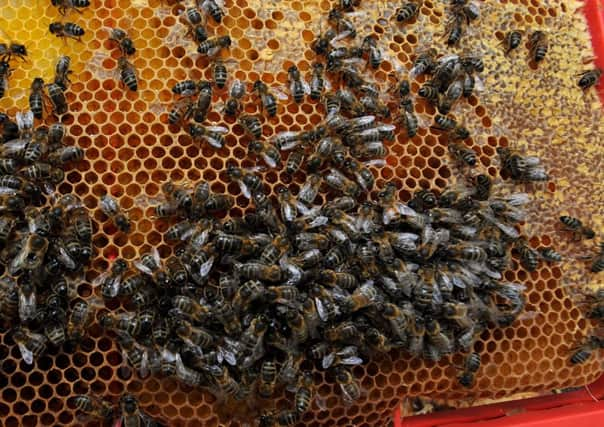Not so perfect windbreak for a bee hive


Of course, I do have an excuse. I had the best of intentions. All the best mistakes start out that way, don’t you find. This one started out with the simple idea that wind can be a big problem for bee hives in winter. So we carefully thought through the best location to place a couple of bee hives so that they were safely out of the wind. After much thought it was decided that the most sheltered place on my friend’s allotment, where we keep the bees, was behind the shed, which would act as the perfect windbreak.
It was an excellent theory and the bees got through the autumn winds nicely protected from the worst of the winds behind the high walls of the shed. Unfortunately there was a small flaw in the logic. The bees were indeed well sheltered by the shed but the shed itself was not quite so fortunate. It blew down onto one of our two hives, knocking the top off and leaving the bees exposed.
Advertisement
Hide AdAdvertisement
Hide AdThis might not have been too much of a problem if either myself or my fellow beekeeper, Mike, had been able to get to the hive quickly and put things right. Unfortunately we had both decided that, with it being winter, the last thing the bees really needed was anyone messing with them and we could both safely go off on holiday at the same time for a few days.
Mike, being a man of sound judgement headed off to the sun of Morocco. My wife and I thought that the ideal choice for a short break was the coast of Northumberland.
It was the first time I had properly visited this coast and I was looking forward to the dramatic countryside and the sea breezes. Unfortunately we chose the night of the storm surge. Sea breeze doesn’t quite do it justice. I had been told that it could be a bit bracing at this time of year. I can confirm that. A full-on gale can indeed be a touch bracing.
Sitting in a sea front cottage surrounded by the sea on two sides, and with the spray from the waves breaking onto the top of the downstairs window, we were left in no doubt about the power of the storm. Fortunately, where we were the wind was blowing out to sea so the seaside cottage was still there in the morning. But we could imagine how frightening it must have been for the many people who had no choice but to watch whilst the power of nature did its worst to their homes.
Advertisement
Hide AdAdvertisement
Hide AdWith climate change predicted to make such events more frequent, the cost, both in human and in financial terms, is not pleasant to think about.
We felt very fortunate to be able to head back to Cononley. Living safely in the middle of the country in a solid stone house, we felt pretty confident that we didn’t need to worry about the impact of the storm there. When we got back, just as it was going dark, to find roof tiles in the garden, a fence blown down and day-old messages on the answerphone from helpful neighbours saying that the bees were in trouble, we felt slightly less smug.
I quickly hightailed it down to the hives and pushed the shed off the upset hive. The bees had been huddled together against the cold in the brood chamber at the bottom of the hive. They appeared to have stayed put and had been protected from the worst of the rain by the shed that had fallen on them. Now that I had removed it, a few of them were milling about on top of the exposed chamber looking cold and confused. I quickly reassembled the hive, covered them up and made them safe. Then, as it was getting dark, I left them to it and headed home.
The next morning Mike and myself went down to the hives and tried to make sure the bees had the best chance of recovering from the experience.
Advertisement
Hide AdAdvertisement
Hide AdWe opened up the top of the hive very quickly and fed them some lovely fondant which we hoped would help keep up their strength. We then decided that we had better remove the mouse guard from the entrance to the hive and clean out any bees that had died as a result of their bad experience.
The bees were very appreciative of our efforts. A couple of hundred very healthy bees poured out of the entrance in a great rush and did everything they could to sting us.
Apparently, high winds and storms can make bees bad tempered. I have decided that they don’t do much for my mood either!